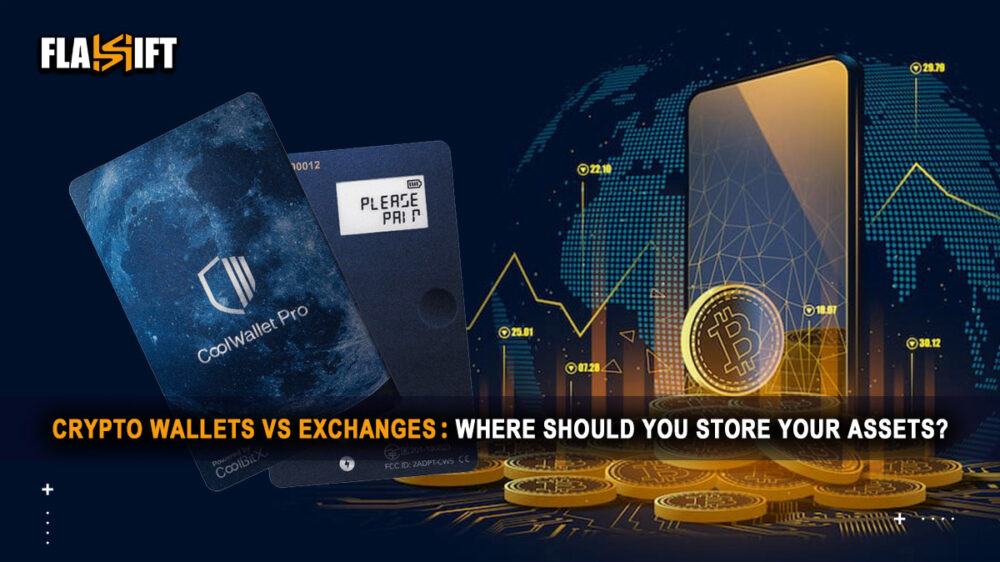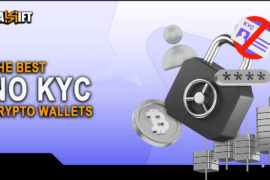Crypto wallets vs exchanges | With increasing threats of cyber-attacks, evolving regulations, and sophisticated storage technologies, the choice between using a private wallet or leaving assets on a crypto exchange is more critical than ever. The question is: Which one is better for holding digital assets?
This article will explain the difference between crypto wallets and exchanges, weigh security and convenience trade-offs, explore regulation considerations, and lead you toward the best decision for your unique crypto experience. Be you long-term HODLer or high-freq trader, this article will spell out what you need to know.
Understanding Crypto Wallets and Exchanges

What Is a Crypto Wallet?
A crypto wallet is a software program or hardware device that stores and manages private keys. Crypto wallets have different types:
- Hot wallets (connected to the internet)
- cold wallets (offline storage), and
- hardware wallets (physical devices like Ledger or Trezor)
Hardware wallets are ideal for long-term holding and enhanced privacy. For more information, read this post: The Most Secure Types of Crypto Wallets
How Do Crypto Exchanges Store Your Funds?
Crypto exchanges keep customers’ digital money in custody. Holding assets on exchanges is helpful for quickly converting between fiat and cryptocurrencies, but it might be risky because the exchange keeps your private keys.
Custodial vs. Non-Custodial Solutions
The primary distinction between wallets and exchanges is custodianship. With custodial platforms, you trust their infrastructure, while with non-custodial crypto wallets, you have complete control over your assets.
Security and Control Over Your Assets

Who Has Your Private Keys?
In the cryptosphere, it’s a widespread mantra: “Not your keys, not your coins.” If you’re on an exchange, you’re delegating control of your funds to someone else. Wallets allow users to have sole possession, cut out custodial risk, and sidestep reliance upon a counterparty.
Hazards of Exchange Hacks and Centralized Intrusions
Crypto exchanges themselves, even the oldest and most prominent, are hackers’ first choices. Well-known victims include Mt. Gox (2014), Coincheck (2018), and the collapse of FTX (2022). Despite better security measures today, exchange-held funds still suffer from systemic risks due to centralization.
Advantages of Cold Storage and Hardware Wallets
Hardware wallets offer the most secure storage by holding private keys offline. They are immune to phishing and malware attacks, don’t require an internet connection, and are best suited for the long-term storage of large amounts of crypto.
Read More: Custodial vs non-custodial crypto wallets in 2025
Convenience, Accessibility, and Daily Use

Trading and Liquidity Advantages on Exchanges
Exchanges are ideal for active traders who need instant access to multiple coins, real-time market data, and fast execution. Centralized platforms also offer margin trading, staking, and integrated tax reports—tools not readily available in standard wallets.
Mobile and Web Wallet Flexibility
Wallets have become more user-friendly, with mobile apps like Trust Wallet and MetaMask. These tools now integrate easily with DeFi protocols and support NFT storage. However, managing seed phrases and gas fees can be less intuitive for beginners.
Combining Wallets and Exchanges for Hybrid Use
A popular strategy in 2025 is combining wallets and exchanges: keeping a small amount on exchanges for trading and the majority in a secure cold wallet. This way, you balance accessibility with security.
Regulation and User Responsibility
Exchange Compliance and KYC Requirements
Most centralized exchanges are regulated under local jurisdictions and must comply with Know Your Customer (KYC) and Anti-Money Laundering (AML) laws. This provides some legal protection but reduces anonymity. Wallets, in contrast, can be used without identification.
Asset Insurance on Centralized Platforms
Some exchanges claim to ensure assets in case of a hack. However, the fine print often excludes certain events or limits payout caps. Wallets offer no such insurance, but users avoid platform-specific vulnerabilities.
Self-Custody and Legal Ownership of Private Keys
By storing your assets in a wallet, you become the custodian. This grants full legal ownership and total access, but also places the responsibility of securing backup keys entirely on the user.
Exchange Oversight in 2025
As regulations tighten globally, exchanges must meet higher standards. This could mean mandatory proof of reserves, insurance disclosures, and geo-restricted services. While this helps improve trust, it also means users might face account freezes or stricter verification.
Wallets and Jurisdictional Control
Using a private wallet shields you from geopolitical risks. You retain access even if your country bans crypto exchanges or freezes local accounts. In 2025, many crypto holders opt for wallets specifically to escape growing government scrutiny.
Choosing the Right Strategy for 2025
Wallets for Long-Term Holding and Security
If you aim to accumulate and hold for years, hardware wallets like Ledger Nano X or Trezor Model T are the most secure options. These are ideal for investors with large portfolios, those prioritizing privacy, and users in politically unstable regions.
Exchanges for Active Traders and Portfolio Balancing
Active users benefit from real-time trading pairs, staking, DeFi integrations, and instant fiat conversions. Exchanges are simply more convenient for frequent trading.
Factors to Consider: Risk Tolerance, Experience Level, and Asset Size
Ask yourself: Are you technically savvy? How much crypto are you managing? What’s your appetite for risk vs. convenience? Beginners might start with a trusted exchange, while advanced users can split assets across wallets and platforms.
Conclusion: Crypto Wallets vs Exchanges | Making the Right Choice for Your Digital Assets
The appropriate storage solution depends on your needs, trading style, and security. Crypto wallets, especially hardware or non-custodial wallets, offer more control and long-term security and are thus ideal for holding assets long-term. Exchanges are convenient and quick for active traders but involve greater risk due to centralization.
Most prudent investors utilize both in a mixture to maximize security and convenience. Understanding the pros and cons of crypto wallets and exchanges allows you to make informed decisions that protect your investments and confidently help your crypto journey.
Stay informed, stay secure, and always remember: your keys, your coins.
FAQ
- Can I store all types of cryptocurrencies in the same wallet?
Yes. Many wallets support multiple cryptocurrencies, but you should ensure the wallet is compatible with the specific digital assets you want to store.
- What are the fees for using a crypto wallet vs. an exchange?
Wallets usually don’t charge storage fees, but you may incur transaction fees (like gas fees) when sending or interacting with dApps—exchanges, on the other hand, charge fees for trades, withdrawals, and sometimes deposits.
- Is using an exchange more convenient than a wallet?
Yes, exchanges are more convenient for active trading, offering real-time access, market data, and liquidity. Wallets, however, are better for long-term storage and privacy.
- How can I ensure my crypto wallet is secure?
Use hardware wallets for cold storage, enable two-factor authentication (2FA) on mobile wallets, and securely keep your private keys and seed phrases offline and backed up.
- Can exchanges be trusted with my crypto for long-term storage?
While exchanges provide convenience, storing your assets on an exchange exposes you to the risk of hacks and breaches. It’s generally safer to use a wallet for long-term storage.







